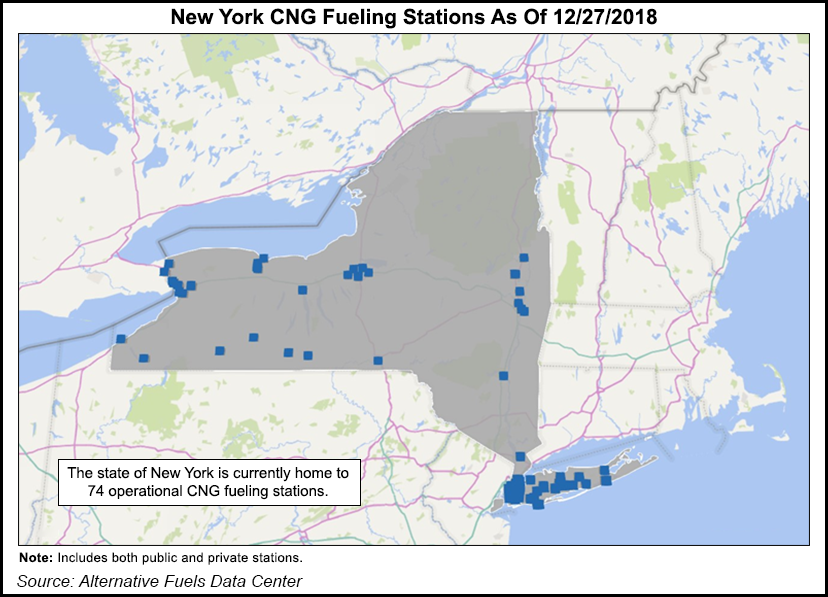Regulatory | Infrastructure | NGI All News Access
NGV Trade Group Urges New York Regulators to Provide More Gas Incentives
With New York state regulators considering offering incentives to spark more electric vehicle (EV) charging infrastructure, the Washington, DC-based trade group NGVAmerica presented testimony recently calling for equal incentives for natural gas vehicles (NGV).

NGVAmerica President Daniel Gage said his association emphasized to the New York Public Service Commission (PSC) that NGVs provide sizable greenhouse gas emission benefits and face many of the same hurdles that EVs face in gaining market share among alternative transportation technologies.
NGV fueling facilities — like their EV counterpart charging stations — can be negatively impacted by high demand charges tied to expanded electricity use needed for gas compression at NGV stations, Gage told NGI.
“As with EV charging stations, higher demand charges for a NGV station’s needed electric compressor operation discourages investments in natural gas fueling infrastructure,” Gage said.
Andrew West, founder and CEO of American Natural Gas and an NGVAmerica board member, told the PSC he supports the encouragement of low-carbon transportation alternatives, but the state regulators are failing to recognize there are options that need equal incentives. West cited the renewable natural gas (RNG) sector.
“RNG in the transportation sector is the only solution that is carbon net negative, meaning that carbon emissions are reduced by more than 100%,” West said. “These technologies should receive the same incentives.”
The PSC is evaluating a consensus proposal submitted by the state’s major utilities seeking authorization for payments and reduced rates for EV infrastructure developers.
The Environmental Protection Agency recently finalized a rule establishing required fuel volumes under the Renewable Fuel Standard program for 2019, and biomass-based diesel for 2020.

“Given that 2018 levels were set lower than 2017, this looks like a positive step forward and recognizes the market for RNG is growing,” Gage said. “Of the 418 million ethanol gallon equivalents, they estimate that 399 million is for natural gas.”
Just before the Christmas holiday weekend, the American Petroleum Institute (API) issued a study that concludes relying on battery storage to advance renewable development will be a slower approach, even if battery prices drop and high natural gas prices incentivize their use. API analyzed a series of scenarios targeting costs for grid storage and natural gas resource availability as variables.
“The low-cost, low-resources case, in which battery costs plunged by 40% and gas prices shot up to average more than $6/MMBtu in 2050, found there would only be 47 GW of battery storage capacity adopted during the study period,” an API spokesperson said.
“The study corroborates what API has been saying all along, namely that natural gas is the natural baseload partner to renewable energy sources, which are still projected to make up 15% of domestic energy use by 2050,” said Todd Snitchler, API vice president for market development and industry operations. Unprecedented declines in battery storage costs would still not dramatically dislodge gas in the power generation sector, Snitchler said.
California and Massachusetts in December took separate actions to push toward zero emission transportation through various programs aimed at electrifying the movement of people and goods.
The California Air Resources Board (CARB) committed the state to having a zero-emissions public transit fleet by 2040. CARB also approved a plan by a Volkswagen AG subsidiary Electrify America to spend $200 million on EV charging infrastructure. The funding is an outgrowth of VW’s settlement with the federal government over its diesel emissions cheating scandal that led to its creation of the Electrify America unit.
The VW program will build charging stations in various metropolitan areas, along highways and in various pilot projects around the state.
In Massachusetts, an advisory committee created by Gov. Charlie Baker recommended that the state require nearly all vehicle sales to be EVs by 2040. It also recommended that Massachusetts take the lead in the creation of a New England regional transportation emissions program along the lines of the regional greenhouse gas initiative now in operation.
© 2024 Natural Gas Intelligence. All rights reserved.
ISSN © 1532-1231 | ISSN © 2577-9877 |
